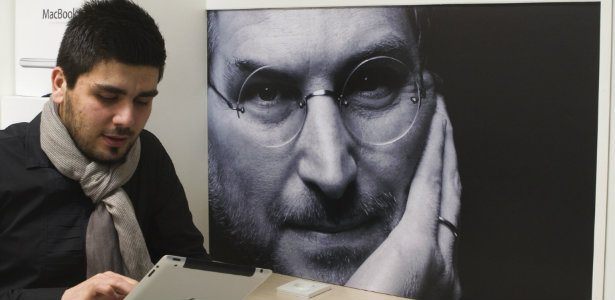Steve Jobs Would Be Appalled by Apple's New Ads
Apple wants to convince middle-aged men to buy their product. But in trying to do so, the company seems to be forgetting everything its founder taught it.

If you've been watching the Olympics, chances are that by now, you've caught at least one of Apple's new TV ads for its Macbook laptops. If not, consider yourself spared.
The spots themselves aren't exactly nauseating, just strangely disappointing when compared to Apple's classic back catalog of commercials -- the marketing equivalent of Michael Phelps' fourth-place finish in the 400 IM.
The new campaign follows a blandly affable Apple Store "Genius" through his encounters with a series of predictably hapless, middle-aged men. In one, a panicked neighbor knocks at 4 a.m., shouts that his wife is in labor, and asks for help making a photo card to announce the birth. The Genius saves the day. In another, a husband has forgotten his anniversary, and wants to make an iMovie for the occasion during the last 20 minutes of a flight. The Genius, again, comes to the rescue.
They come off as boring riffs on Best Buy's tried and true "Geek Squad" ads, and seem to undercut the idea Apple has always pushed that its software is so well designed, anybody can use it.
But the third commercial in the series isn't just boring and off key. It's also gratingly smug. This time, the clueless middle-aged dude walks up to the Genius, who appears to be standing in line for the latest Apple release.
"I basically just got a Mac myself," says the clueless middle-aged dude.
"Wait, what do you mean basically?" the Genius asks.
"Basically, it looks like a Mac."
Lo and behold, it turns out the computer has none of a Mac's cool built in features. Clueless middle-aged dude seems to have bought it from a generic, garrishly lit up electronics shop.
"So this is nothing like a Mac," he says, now resigned.
"Basically...not..not...no."
The punchline is, basically, terrible.
Under Steve Jobs, Apple's commercials were arguably as key to its success as its products. They were certainly as innovative. It invented the modern Super Bowl ad with its famous "1984" spot, still often cited as the greatest ad of all time. You can hear echos of its "Think Different" campaign every time a company attempts to creatively mangle language in the service of a catchy slogan. It personified Macs as a likeable, vaugely hipsterish young guy and PCs as the office nerd -- thus turning attack ads into a feelgood comedy routine.
All of its greatest hits shared something fundamental -- the idea that you are your gadget, that technology was not just a package of specs, but a defining aspect of your lifestyle.
In "Think Different," Apple declared it was the brand for people who idolized Bob Dylan and Jim Hansen, the successful iconoclasts, the "crazy ones" who changed the world. Its iPod commercials, short dance numbers set to NPR-friendly indie rock, radiated youth and energy while mimicking the fashionable minimalism of the products themselves. It showcased the iPhone's and iPad's elegance in stripped-down product demonstrations that seemed to say: "This is what it means to have taste." As AdWeek's Tim Nudd wrote after Jobs' death, the Apple founder's lasting contribution to advertising was "merging aesthetics and ethics, and his combative obsession with good and evil...." Buying Apple wasn't about buying the best computer. It was about buying your best self.
The new ads aren't about aspirations. They're a defensive attempt to appeal to the one demographic the company's past commercials always seemed to ignore -- those seemingly hapless middle-aged dudes. So they trot out some features -- middle-aged dudes like utility, right? -- and try to assure the forty-something male viewers that, yes, Apple cares about their lives too. Yet by doing it in such a predictable, shopworn way, it just feels as if they're demeaning the audience. They're certainly not trying to inspire it.
And so oddly, the most "Apple" ad on television might well belong to its great rival, Google. It takes us on a beautifully shot camping trip with a father and son, who pull out and play with the company's Nexus 7 tablet all along the way. It's a story book. It's a chess board. It's a compass. It's a short, heartfelt minute about about the ideal of fatherhood, about being the best man you can be. If Steve Jobs were trying to sell to middle-aged dudes these days, I wouldn't be surprised if the results looked something more like this.